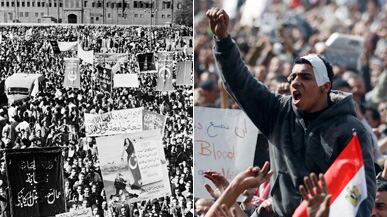Obsessively consuming all the multimedia news about the popular uprising in Egypt, I pause at the image of a young man holding a reprint of an old black-and-white photograph of a handsome colonel: Gamal Abdul Nasser. The man is standing in a Cairene street framed by a large, attractive Art Deco building in the background. Built by another Egypt of the 1920s.

This is an odd time for me. My book, Late for Tea at the Deer Palace, is coming into the world while I'm distracted by the uprising in Egypt. I keep finding intersections between them, the book and the uprising, in the strangest of things. There are also intersections of the past and the present, as I run through the sections in the book that feature Cairo. Both Egypt and Iraq were the leaders in the Arab world, albeit competitors with each other. Until 1952, Egypt was regarded as the model state in Iraq; after the rise of Nasser, it presented a specter of revolution.
Nasser led the 1952 revolution, a military coup that overthrew the system that built that building, along with several key institutions of the state. Many argue he ended a long era of cosmopolitanism and liberalism in Egypt. But even more people remember his charisma and his fight against the colonial powers of the time, Britain and France, that made Egypt and the Arabs proud. They would argue that the king he overthrew was corrupt and decrepit.
My late grandmother Bibi, who is a main character in Late for Tea, would not have approved of the boy with the photo. I know that she would have had a few words to tell him about Nasser and the world he overthrew with his coup. She would have lectured him on the panic he spread in Baghdad with his fiery radio station, Sawt al-Arab, but also of the energy of the city in the '40s; the buildings, the theaters, the fashion, the music—she was a huge fan of Umm Kalthoum and Muhammad Abdul Wahab, and of Egypt's place in the world. While her son Hassan was a law student at King Fouad University, she had ample excuses to visit the city. It was a model for the rest of the Arab world, and she took heart that Baghdad was fast catching up.
But I don't blame the young boy for carrying that picture. It makes perfect sense. He was yearning for a time when he had heard Egypt was strong, seeking to root himself in national pride. Evidently he was oblivious to Nasser's role in creating the foundation of the current oppression he seeks to topple, but it is as far back as he can go.
I noticed the same thing in Baghdad frequently. On a recent trip to the old souk, I entered a little shop that was entirely dedicated to General Abdul Karim Qassim. He was the military man who overthrew Iraq's monarchy in 1958, and with it, a parliamentary system and a liberal era however imperfect, paving the road to Saddam Hussein's totalitarianism.
Seeing the protests on Egypt’s streets calling for the fall of the dictator also reminds me of a tragic moment in 1991 when the people of Iraq did the same, and were brutally crushed by Saddam Hussein.
Seeing the protests on Egypt's streets calling for the fall of the dictator also reminds me of a tragic moment in 1991 when the people of Iraq did the same, and were brutally crushed by Saddam Hussein. Hundreds of thousands lost their lives. Back then, media wasn't allowed in Iraq. There was no Internet; Twitter or Facebook didn't even exist.
Are we just nostalgic? I think it is much more than that. The revolutionary era whether in Egypt or Iraq stretches back to more than a generation. In Egypt, it has not obliterated the mores of a place that has known better times. Today's Egyptian uprising has been considerably civil. People protecting each other, their national museum, and cleaning the streets. This is not a mob revolution, despite attempts of the government to portray it as such. But this is another story. Back to the civility of uprising and the era of Nasser: Revolution probably succeeded in severing the continuity of memory.
Reclaiming this train of memory has to first be an individual effort of reconstruction, before it becomes an accumulated, collective rescued heritage. In Late for Tea at the Deer Palace, I collected the memories of a multi-generation family in Iraq first as a way to find my way into Iraq, and not just its political history, but also in the hope that it can be useful to other fellow Iraqis, and to be appreciated by everyone else.
The memory of pre-1952 Cairo is unknown among the young. The same goes for pre-1958 Baghdad. Bibi's Baghdad, and later my uncle Hassan's, who had also lived in the last days of pre-1952 Cairo, was also a world apart from the one we see today on the same TV screens. The memory of that Baghdad is all but dead, along with the old men who have seen too much. The cafes on the banks of the Tigris with the travelling storytellers, the cantankerous poets who fought each other with verse in their competing literary salons, the old brick mosques, and the newly laid avenues: Most are gone.
Remembering, recovering, and reconstructing lead us to many different stories. All those stories are important for the foundations of the future. The self-confidence of young generations searching for their place in the world need it, not just as a lamentation of the past, but to make sense of their own history, for a balanced awareness of their own inheritance.
Tamara Chalabi is the author of Late for Tea at Deer Palace: The Lost Dreams of My Iraqi Family. She holds a Ph.D. in history from Harvard University and has written for The Wall Street Journal, The New Republic, Slate, and The Sunday Times, among other publications. She is executive director of the Abdul Hadi Chalabi Foundation, which runs the organic farming project Green Iraq and a prosthetic limbs fitting program.
Plus: Check out Book Beast for more news on hot titles and authors and excerpts from the latest books.






